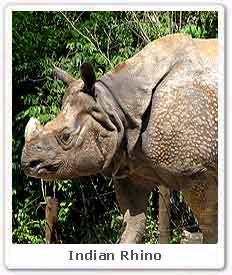| Kingdom : | Animalia |
| Phylum : | Chordata |
| Class: | Mammalia |
| Order : | Perissodactyla |
| Family : | Rhinocerotidae |
| Genus : | Rhinoceros |
| Species: | R. unicornis |
| Zoological name : | Rhinoceros unicorn |
| Found In : | Kaziranga National Park and Bandhavgarh National Park in India |
 Physical appearance : Indian Rhinoceros is silver brown
in colour and has folds all over its body. Both male and female rhinoceros
have one horn. Males weigh around 2200 kg while the females weigh around
1600 kg. Male rhino is 1.8 m tall while the females are 1.6 m tall. They do
not have hairs on their body. Their horn is 20 -61 cm long. It has well
developed incisor teeth and two long canine teeth in its lower jaw. They
have poor eyesight.
Physical appearance : Indian Rhinoceros is silver brown
in colour and has folds all over its body. Both male and female rhinoceros
have one horn. Males weigh around 2200 kg while the females weigh around
1600 kg. Male rhino is 1.8 m tall while the females are 1.6 m tall. They do
not have hairs on their body. Their horn is 20 -61 cm long. It has well
developed incisor teeth and two long canine teeth in its lower jaw. They
have poor eyesight. Presence in India : Indian Rhinos are mostly found in the North eastern parts of India especially Assam and the foothills of the Himalayas. Indian Rhinos can also be spotted in the Kaziranga and Bandhavgarh National Park in India.
Habitat : Indian Rhinos prefers tropical bush lands, riverine grasslands, marshy low lands and reed beds.
Diet : Indian Rhinoceros is herbivorous. They feed on fruits, twigs, leaves, cultivated crops, shrubs and aquatic plants.
Reproduction :Females attain sexual maturity at 4 years of age and the males attain the sexual maturity at 8 years of age. They mate throughout the year. Gestation period rests for 462- 491 days after which the female give birth to single rhino calf. New born do not have horn. They are weaned around 18 months.
Conservation status : Endangered species
Lifespan : Lifespan of the Indian Rhinos is about 47 years.






